Dental Business Guide Podcast Episode | 8th February 2021
Arun Mehra and Nigel Crossman
Unlocking Opportunities: Exploring the Climate for Dental Practice Growth in the UK
Dental practices in the UK have been facing some changes recently. These changes include new laws and different patient needs, which are making the dental practice environment evolve. However, there are still great opportunities for dental practices to grow and succeed in the UK. By using the right strategies and approach, dental practices can reach their full potential and achieve significant growth in a short time.
In this blog post, we will explore some of the main factors that are driving growth in the dental practice industry in the UK. We will look at things like changes in the population and advances in technology, and how these trends are shaping the future of dental practices in the UK.

Read our guide on How to Grow a Dental Practice.
Introduction to the current climate for dental practice growth in the UK
The dental business in the UK is going through a time of change, providing many opportunities for dental practices to grow and expand. This is due to advancements in technology, changing patient expectations, and evolving healthcare approaches, all of which are continuously shaping the field of dentistry.
One significant factor contributing to the growth potential of dental practices is the increasing emphasis on oral health and its connection to overall well-being. People are becoming more aware of the importance of regular dental check-ups and preventive care, leading to a higher demand for dental services to maintain and improve their oral health.
Moreover, advancements in dental technology have revolutionised the field, offering dentists innovative tools and techniques to provide better patient experiences and outcomes. From digital imaging and CAD/CAM technology to laser dentistry and minimally invasive procedures, these changes have not only improved the quality of care but also expanded the range of services that dental practices can offer.
Additionally, the ageing population in the UK is also contributing to the growth of dental practices. As people age, they require specialised dental care, such as dentures, implants, and other supportive procedures. This creates a niche market for dental practices to cater to the unique needs of this segment.
Furthermore, the growing healthcare policies and the increasing availability of dental insurance coverage have made dental care more accessible to a larger portion of the population. As a result, more patients are seeking dental treatments and services, providing dental practices with a larger customer base to serve.
However, it’s important to acknowledge that the current environment for dental practice growth also comes with its challenges. Competition within the industry is fierce, with various dental practices vying for the same pool of patients. To succeed in this competitive landscape, dental practices need to stand out by offering excellent patient experiences, personalised care, and effective marketing strategies.
Action Points
- Promote Oral Health: Educate on the significance of oral health for increased preventive care services.
- Invest in Technology: Utilize advanced dental technologies for better patient care and expanded services.
- Focus on Seniors: Offer specialized services for the aging population’s dental needs.
- Maximize Insurance Benefits: Make use of healthcare policies and dental insurance to attract a wider patient base.
- Stand Out: Differentiate your practice with superior patient experiences and personalized care.
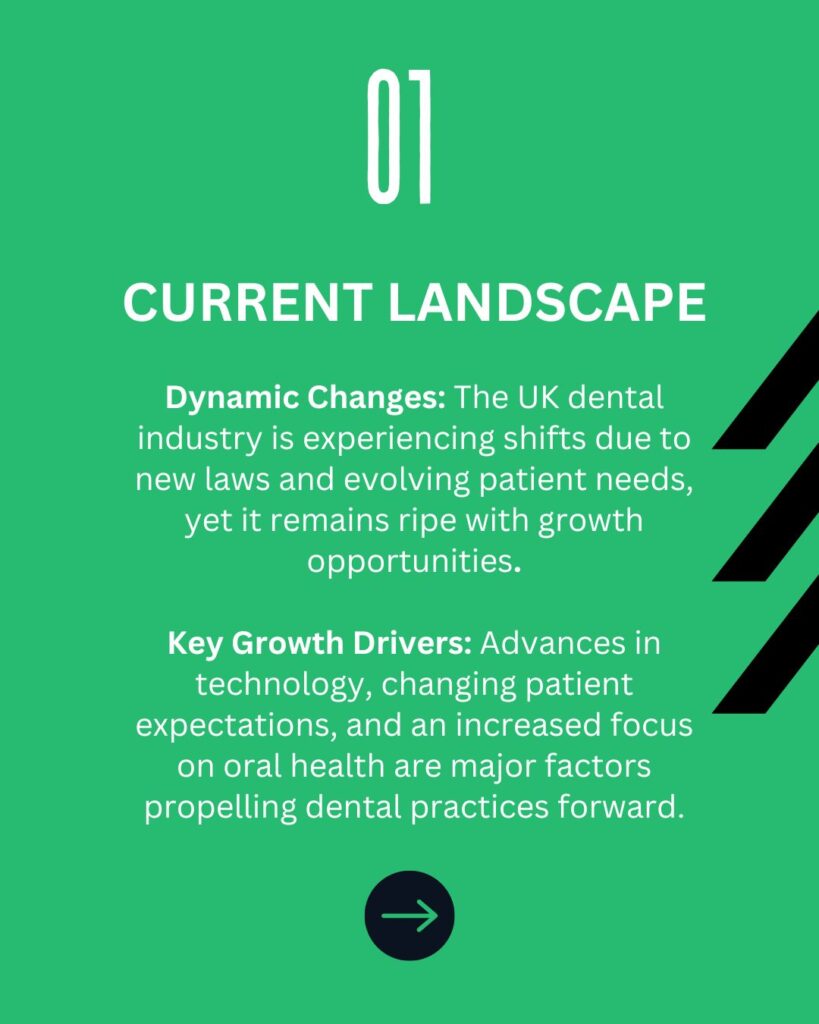
Read our guide to setting up a private dental practice.
Factors influencing the growth of dental practices in the UK
The growth of dental practices in the UK is influenced by several important factors that shape the current environment for dental practice development. Understanding these factors is crucial for dental professionals who want to open new opportunities and expand their practices.
Firstly, there is a growing demand for dental services. As the population grows and ages, the need for routine dental care, cosmetic dentistry, and specialised treatments continues to rise. This increasing demand creates a favourable environment for dental practices to attract more patients and increase their revenue.
Another factor impacting practice growth is the advancement of dental technology. Innovations such as digital dentistry, CAD/CAM systems, and laser dentistry have transformed the field, improving treatment outcomes and patient experiences. Practices that embrace and invest in these technologies tend to attract more patients and gain a competitive edge in the market.
The evolving regulatory landscape also affects the growth of dental practices. Changes in regulations and policies, such as the NHS contract changes and the expansion of private dental care, can create new opportunities for practices to adapt their business models and expand their service offerings. Staying informed about these regulatory developments is essential for dental professionals to stay ahead and capitalise on emerging trends.
Moreover, there is an increasing emphasis on preventive care and patient-centred approaches in the dental industry. Practices that focus on patient education, engagement, and personalised treatment plans tend to build long-term patient relationships, leading to increased loyalty and referrals. Building strong patient relationships through excellent customer service and patient-focused care has proven to be a catalyst for practice growth.
Finally, economic factors play a crucial role in shaping the growth of dental practices. Overall economic stability, consumer spending power, and insurance coverage all impact patients’ willingness to seek dental treatments. Understanding the economic environment and adjusting pricing strategies and payment options accordingly can help practices attract and retain a diverse patient base.
In conclusion, various factors influence the growth of dental practices in the UK. The increasing demand for dental services, advancements in technology, regulatory changes, patient-centred approaches, and economic factors all contribute to the exciting opportunities available for dental professionals to expand their practices. Staying informed, embracing innovation, and adapting to the changing landscape are key to unlocking growth potential in the dynamic dental industry.
Action Plan
- Capitalize on Demand: Focus on expanding services to meet the growing need for routine, cosmetic, and specialized dental treatments.
- Invest in Innovation: Embrace and integrate the latest dental technologies to enhance treatment outcomes and patient experiences.
- Navigate Regulations: Stay informed about regulatory changes and adapt business models to leverage new opportunities in both NHS and private sectors.
- Emphasize Preventive Care: Develop patient-centered approaches, focusing on education and engagement to foster long-term relationships and loyalty.
- Adjust to Economic Conditions: Tailor pricing strategies and offer flexible payment options to accommodate the economic status and insurance coverage of patients.
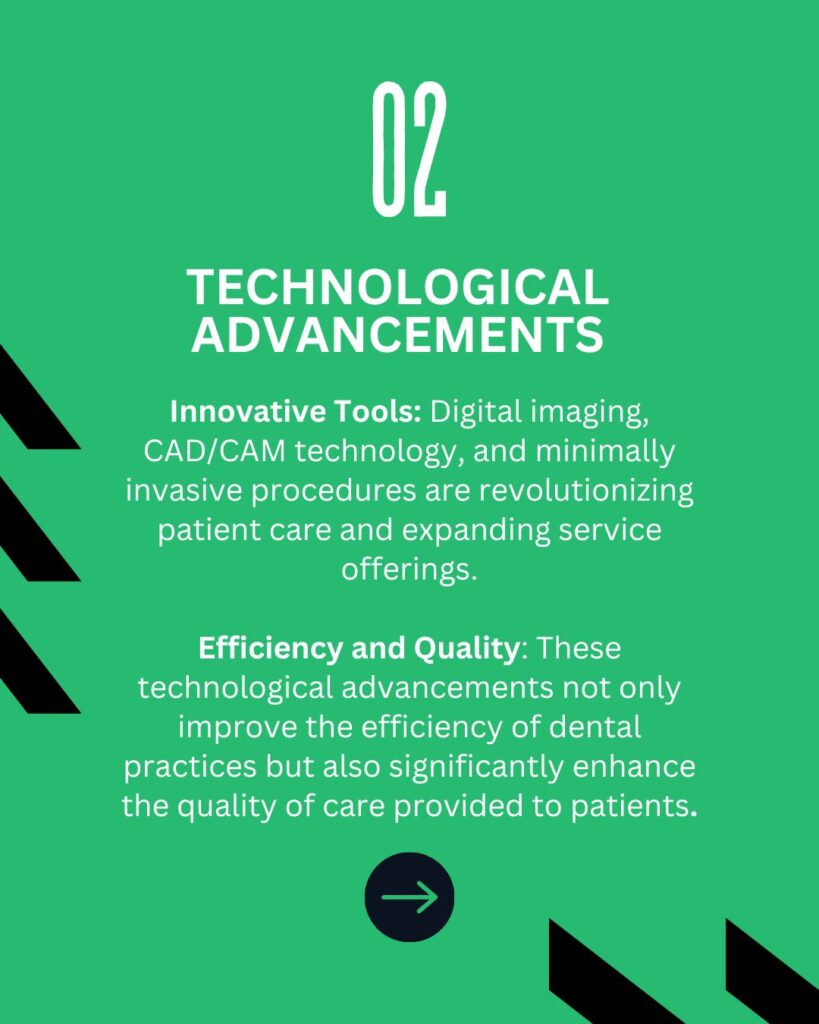
Contact us to find out more
Demographic trends and their impact on dental practice growth
Segment trends play a crucial role in shaping the environment for dental practice growth in the UK. Understanding these trends can help dental professionals seize opportunities and tailor their services to meet the growing needs of the population.
One key trend is the aging population. As people live longer, there will be an increased demand for dental services among older adults. This group often requires specialised dental care, such as dental implants, dentures, and oral health management for ongoing conditions. Dental practices that can meet the unique needs of older patients might find themselves in high demand.
Another important segment trend is the rising diversity of the UK population. With globalisation and migration, dental practices have the chance to serve a more diverse range of patients. This includes people from different cultural backgrounds who may have specific oral health needs or preferences. Practices that can adapt to and embrace diversity will be well-positioned to attract and retain a broader patient base.
Additionally, the younger generation presents both opportunities and challenges for dental practice growth. Millennials and Gen Z are more conscious of their oral health and will invest in preventive dental care. However, they also have higher expectations when it comes to convenience, technology, and personalised experiences. Dental practices that can leverage digital tools, offer flexible appointment options, and provide a patient-centered approach will be able to capture the loyalty of these younger patients.
It is also important to consider the impact of regional demographic variations. Different areas in the UK may have specific population dynamics, with variations in age profiles, economic status, and oral health needs. Dental practices that conduct comprehensive market research and tailor their strategies to the specific demographics of their local area have a competitive advantage in the pursuit of growth.
In conclusion, staying aware of segment trends is crucial for dental practices seeking to unlock growth opportunities. By understanding the needs and preferences of different segment groups, practices can tailor their services, attract a diverse patient base, and position themselves for long-term success in the ever-growing landscape of dental care in the UK.
Action Points
- Cater to an Ageing Population: Develop specialized services for older adults, focusing on implants, dentures, and chronic condition management.
- Embrace Cultural Diversity: Adapt services to cater to the oral health needs and preferences of a culturally diverse patient base.
- Engage Younger Generations: Leverage digital tools and offer personalized, convenient services to meet the expectations of Millennials and Gen Z.
- Tailor Strategies Locally: Conduct market research to understand local demographic trends and tailor services to meet regional needs.

Read our guide to buying a private dental practice.
Facts and figures about Dental practice growth in the UK
The Dental Practices industry in the UK was worth £6.6 billion in 2022, and it grew by 17.2% compared to the previous year. However, between 2017 and 2022, it experienced a yearly decline of 2.7% on average.
In the UK, the Dental Practices industry lost market share faster than the overall economy and the Human Health and Social Work Activities industry. It ranked eighth in size among the Human Health and Social Work Exercises industries and was the 132nd largest industry in the UK.
The main factor negatively affecting this industry is people’s real disposable income, while high industry support is the primary positive factor. Better dental hygiene has improved the condition of people’s teeth as they age, leading to increased demand for dental services as the population gets older. Older people are a significant market for dental practices.
As the number of people aged 65 and older increases in 2022 and 2023, there will be more opportunities for dental offices to provide their services.
Action Points
- Industry Value: The UK Dental Practices industry was valued at £6.6 billion in 2022, growing 17.2% from the previous year.
- Aging Population: Increasing demand for dental services with the growing number of people aged 65 and older.
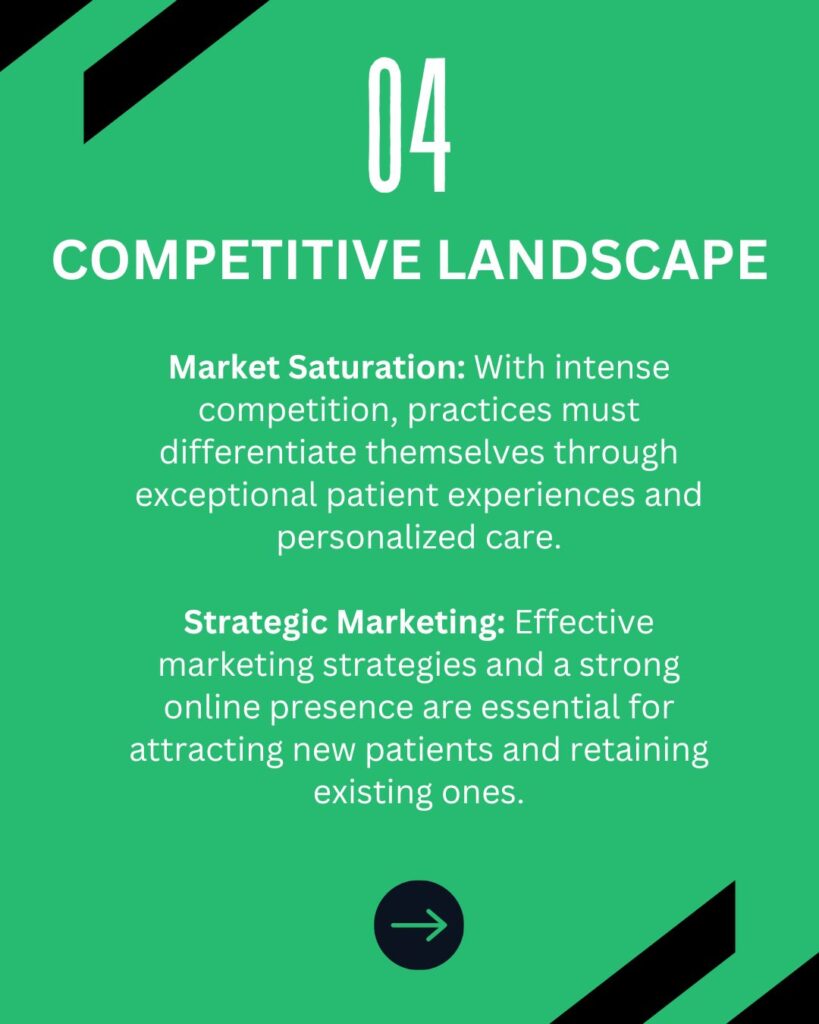
Regulatory and policy changes affecting the dental industry in the UK
Recently, the dental business in the UK has experienced significant changes in rules and policies that have a big impact on the growth and development of dental practices. These changes have not only affected how dental experts operate but also created opportunities for growth and expansion.
One major change is the introduction of the General Data Protection Regulation (GDPR) in 2018. This regulation made data security stricter, requiring dental practices to review their data management processes and ensure compliance. While this might seem like an extra burden, it has also given dental practices a chance to improve their reputation by showing a commitment to data security and privacy.
Another significant change in the dental industry is the shift towards preventive and comprehensive approaches to oral health. With a greater focus on patient education and prevention, dental practices have the opportunity to position themselves as leaders in promoting overall health and oral well-being. They can do this by offering comprehensive oral hygiene programs, promoting healthy lifestyle choices, and adopting advanced technologies for early detection and intervention.
Moreover, the changes in the NHS dental contract have brought both challenges and opportunities for dental practices. The new contract aims to improve patient access to dental care and encourage preventive measures. This shift towards a preventive-centred model provides opportunities for practices to stand out by offering innovative and patient-centred services that go beyond traditional treatments.
Additionally, the ongoing changes in reimbursement structures and fee schedules have prompted dental practices to rethink their pricing strategies and explore alternative sources of revenue. Practices that proactively adapt to these changes by implementing efficient cost management, exploring private treatment options, and embracing digital solutions have a greater chance of thriving in the evolving dental landscape.
Overall, the regulatory and policy changes in the UK dental industry have created a dynamic environment that demands adaptability and innovation. Dental practices that stay updated with these changes and leverage the opportunities they present will be well-positioned for growth and success in the ever-changing dental landscape.
Read our guide on How to Build a Dental Group.
Technological advancements and their role in driving dental practice growth
In the UK, technology has played a crucial role in improving dental practices. Dentists now have access to many advanced tools and innovations that enhance patient care, streamline operations, and ultimately lead to practice growth.
One significant advancement is the use of digital dentistry. This includes tools like 3D scanners and intraoral cameras that have changed how dentists diagnose and treat patients. These tools provide detailed and precise images, allowing for more accurate treatment planning and better patient outcomes. Digital impressions have also replaced messy traditional impressions, saving time and making patients more comfortable.
Another area where technology has made a big impact is in dental implants. Computer-aided design and computer-aided manufacturing (CAD/CAM) systems have revolutionised the way custom dental prosthetics are made. This not only improves the fit and feel of the final restoration but also reduces the time it takes to provide implant treatments.
Furthermore, advancements in practice management software have streamlined administrative tasks, making dental practices operate more efficiently. These software systems automated appointment scheduling, patient records management, billing, and inventory management, freeing up time for dentists and staff to focus on providing quality care.
Moreover, technology has also improved patient communication and engagement. Dental practices can now use various digital platforms to communicate with patients, send appointment reminders, and provide educational materials. This enhances patient satisfaction and loyalty, leading to more referrals and practice growth.
Overall, technological advancements have transformed the dental industry in the UK. From digital imaging systems and CAD/CAM technology to practise management software and patient communication tools, the role of technology in driving dental practice growth is significant. Embracing these advancements can create new opportunities and help dental practices thrive in an ever-evolving landscape.
Opportunities for expansion and innovation in the dental field
The dental field in the UK has many exciting opportunities for growth and progress. Thanks to advancements in technology and the changing needs of patients, dental practices have the potential to thrive in this ever-changing environment.
One significant opportunity for growth lies in the increasing demand for specialised dental services. As the population gets older, there is a growing need for dental professionals who focus on caring for older adults. Dental practices can tap into this market and cater to people who require special attention, and they are willing to pay more for it.
Another way to grow is by incorporating technology into dental practices. From digital imaging and 3D printing to tele-dentistry and virtual consultations, technology offers various opportunities to provide efficient and convenient dental services. Practices that adopt these innovations can stand out from competitors and attract informed patients who value personalised care and convenience.
Moreover, the growing emphasis on preventive and restorative dentistry presents additional growth opportunities. Dental practices that offer comprehensive services like teeth whitening, orthodontics, and dental implants can attract patients who want to improve their smiles and overall oral health. By staying up-to-date with the latest trends and techniques in cosmetic dentistry, practices can position themselves as leaders in the field and build a loyal patient base.
Innovation in the dental field goes beyond clinical services. Dental practices can explore opportunities for expanding their reach through strategic partnerships and collaborations. For instance, teaming up with local healthcare providers or health centres can lead to cross-referrals and a broader patient base. Additionally, exploring options like tele-dentistry or mobile dental units can help reach under-served communities and expand the practice’s footprint.
In conclusion, the dental field in the UK offers plenty of opportunities for expansion and growth. By identifying niche markets, embracing technology, offering comprehensive services, and exploring strategic partnerships, dental practices can unlock their full potential for success and growth. With the right strategies and a commitment to excellence, the possibilities in the dental industry are limitless.
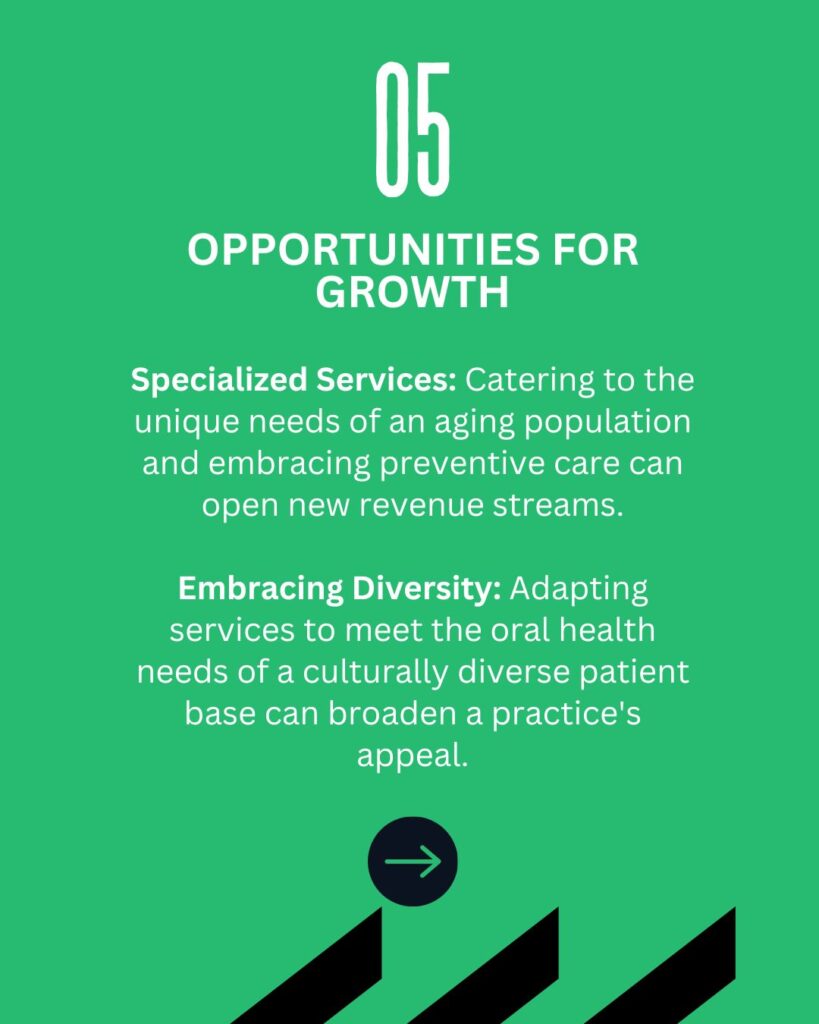
Strategies for attracting and retaining patients in a competitive market
In a highly competitive market, attracting and keeping patients is crucial for the growth and success of your dental practice. Here are some effective strategies to help you stand out and build a loyal patient base:
Improve your online presence: In today’s digital age, having a strong online presence is essential. Create a user-friendly and visually appealing website that showcases your services, expertise, and patient testimonials. Optimise your website for search engines to improve its visibility and reach. Engage with patients on social media platforms to build relationships and showcase your practice’s personality.
Provide outstanding customer service: Offering excellent customer service is essential for retaining patients. Train your staff to be friendly, attentive, and knowledgeable. Ensure your patients feel valued and heard by actively listening to their concerns and addressing their needs. Personalise the patient experience by remembering their names, preferences, and treatment history. Going the extra mile will leave a lasting impression and foster patient loyalty.
Implement patient referral programs: Word-of-mouth referrals are powerful in the dental industry. Encourage your satisfied patients to refer their friends, family, and colleagues by offering incentives like discounts on future treatments or free services. Promote your referral program through various channels, including your website, online platforms, and in-office signage.
Focus on patient education: Educating your patients about oral health and the importance of regular dental visits is not only beneficial for their well-being but also for building trust and loyalty. Provide educational materials, blog posts, and informative videos on your website and social media platforms. Take the time to explain treatment options, procedures, and preventive measures during patient appointments. Well-informed patients are more likely to value your expertise and continue seeking your services.
Stay connected through regular communication: Establish a regular communication system to stay connected with your patients. Send out newsletters or emails featuring dental tips, practice updates, and upcoming promotions. Consider implementing appointment reminders and follow-up messages to ensure patients stay on track with their oral healthcare. By maintaining consistent communication, you will strengthen the patient-provider relationship and keep your practice top of mind.
By implementing these strategies, you can differentiate your dental practice in a competitive market and attract new patients while retaining existing ones. Remember, a strong online presence and providing exceptional care are the keys to long-term success in the dental industry.
Action Points
- Online Presence: Boost your dental practice’s visibility with a user-friendly website and active social media engagement. Optimize search engines and share patient testimonials.
- Customer Service: Elevate patient experiences with exceptional service. Personalize care and ensure staff are welcoming and responsive to patient needs.
- Referral Programs: Encourage word-of-mouth through patient referral incentives, promoting loyalty and attracting new patients.
- Patient Education: Build trust and loyalty by educating patients on oral health, treatment options, and preventive care.
- Regular Communication: Keep in touch with patients through newsletters, appointment reminders, and follow-up messages to maintain a strong patient-provider relationship.
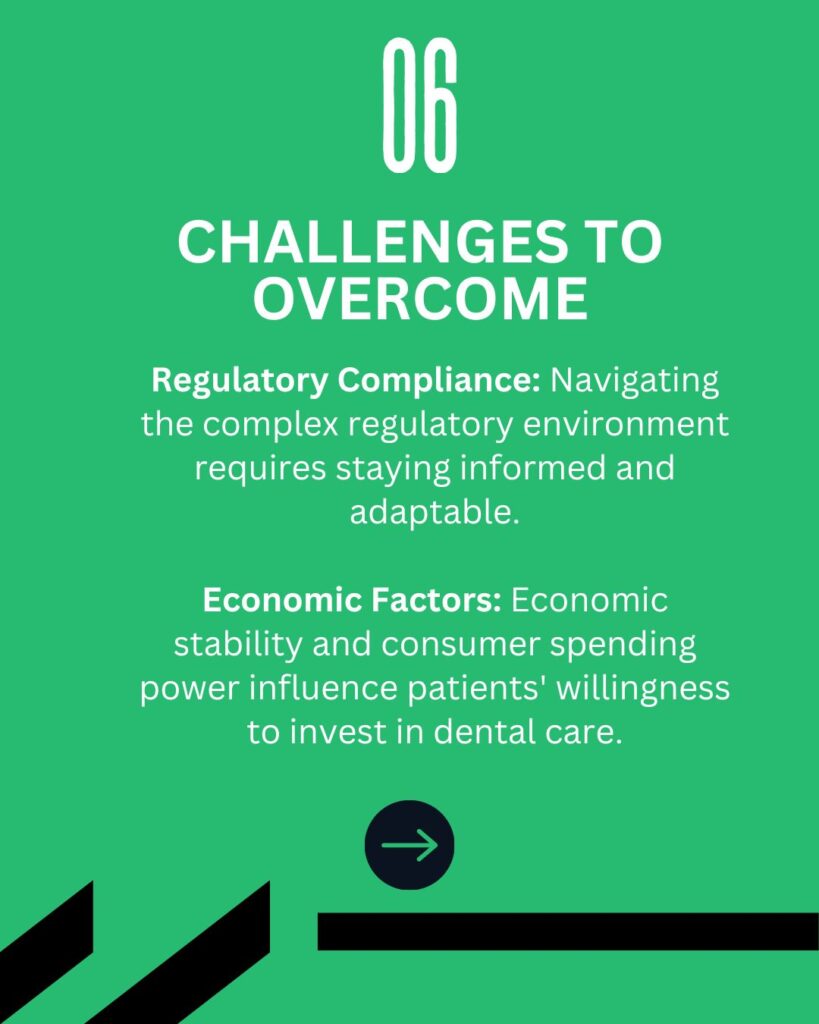
Read our guide on How to Retain New Dental Patients.
Financial considerations and funding options for dental practice growth
When it comes to growing your dental practice, money is an important factor to consider. Expanding your practice, buying new equipment, and hiring more staff all require funding. However, finding the right funding for your dental practice growth can be challenging if you don’t know the available options.
One common funding option is a business loan from a bank or financial institution. These loans provide a lump sum of money that can be used for various expansion projects. Before applying for a loan, it’s essential to assess your needs and determine how much funding you’ll require. Create a detailed business plan that outlines your growth strategies, projected income, and repayment plan to increase your chances of approval.
Another funding option is seeking investment from private investors or venture capitalists. This involves selling a portion of your practice’s ownership in exchange for capital. While this can be a great way to get funds, it’s important to carefully evaluate potential investors and negotiate favourable terms to protect your long-term interests.
Moreover, there might be government grants and programs available to support dental practice growth. Research local, regional, and national initiatives aimed at promoting healthcare professions, including dentistry. These grants can provide financial assistance, training opportunities, or tax incentives, helping you expand your practice while minimising financial strain.
Lastly, consider exploring partnerships or joint ventures with other dental professionals. Pooling resources and expertise can lead to collaborations that drive growth while sharing financial burdens. This collaborative approach allows for shared investments in new technologies, marketing campaigns, or office expansions, all while benefiting from each partner’s patient base and networks.
Read our guide on How to Finance a Dental Practice.
Before making any financial decisions, it’s crucial to consult with financial advisors or industry experts who can provide guidance tailored to your specific circumstances. They can help you understand the potential risks and rewards of different funding options and develop a sustainable growth strategy for your dental practice. By carefully considering financial considerations and exploring funding options, you can open doors for significant growth and success in the dental industry.
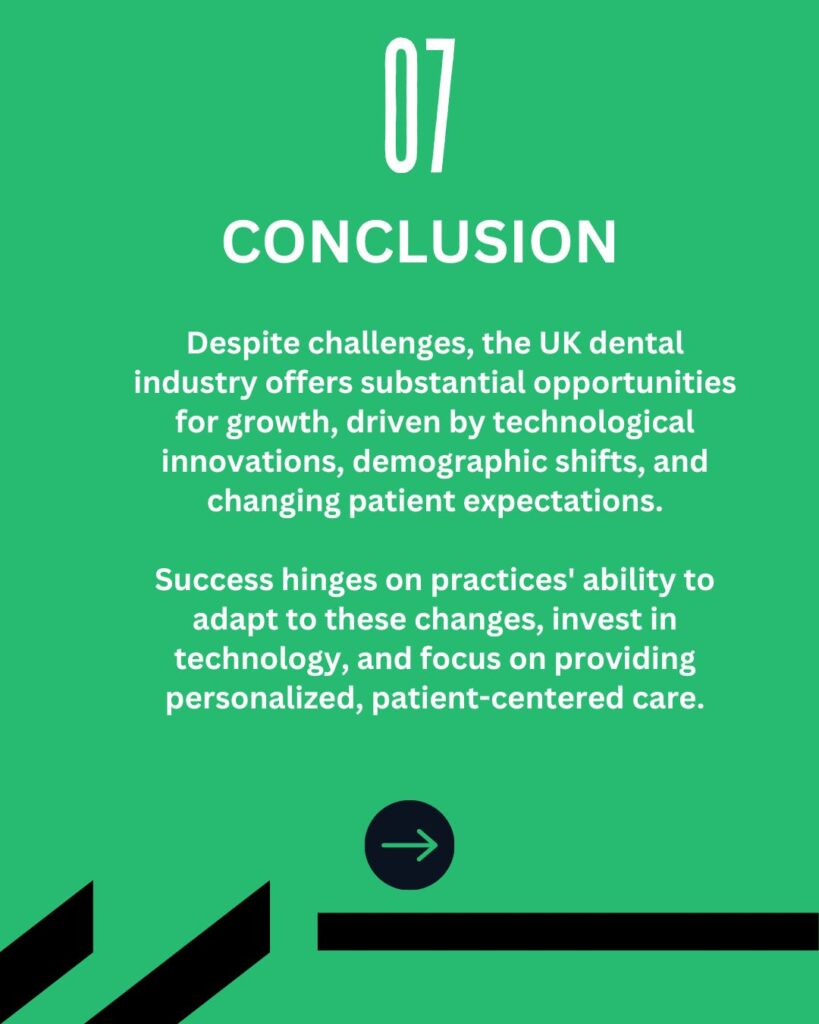
We hope you found our exploration of the environment for dental practice development in the UK helpful and insightful. As the dental industry continues to evolve, it’s crucial for dentists to adapt and seize opportunities for growth. By staying updated on the latest trends and factors influencing the business, you can position your dental practice for success. Whether you’re a new professional or an experienced one, there are always opportunities waiting to be explored.
Check out our other articles, webinars and podcasts in the Samera Learning Centre
Frequently Asked Questions Dental Practice Growth in the UK
What factors are driving dental practice growth in the UK?
The growth of dental practices in the UK is driven by several factors, including increasing patient demand for dental services, advances in dental technology, and the rising popularity of cosmetic and specialized dentistry. Government regulations supporting oral health and greater access to financing options for expanding or starting new practices also contribute to growth. Additionally, changes in patient demographics and a shift toward private dental care are fostering more opportunities for practice expansion.
How does economic stability impact the expansion of dental practices?
Economic stability significantly impacts the expansion of dental practices. During stable economic periods, patient spending on both essential and cosmetic dental services increases, providing opportunities for growth. Access to financing becomes easier, allowing practices to invest in new technology, expand facilities, or open new locations. Conversely, economic downturns may reduce patient demand for non-essential treatments and limit available funding, making expansion more challenging. Practices that adapt to economic conditions with flexible service offerings can sustain and even thrive.
What role do government regulations play in dental practice growth?
Government regulations play a critical role in dental practice growth by setting standards for patient care, licensing, and operational compliance. These regulations ensure patient safety, guide insurance and reimbursement practices, and establish protocols for clinical procedures. Favorable policies, such as grants or tax incentives for healthcare providers, can encourage expansion, while strict regulations may add operational costs. Compliance with these rules is essential for sustaining and scaling a dental practice successfully.
How can dental practices adapt to changing patient demographics?
Dental practices can adapt to changing patient demographics by offering services tailored to specific age groups, cultural needs, or emerging health trends. For example, as the population ages, demand for geriatric dental care may rise, while younger patients might seek cosmetic treatments. Practices can also integrate multilingual services or flexible payment options to cater to diverse patient bases. Using data analytics to track patient preferences and trends can help adjust marketing strategies and service offerings to align with demographic shifts.
What financing options are available for growing a dental practice in the UK?
Financing options available for growing a dental practice in the UK include traditional bank loans, healthcare-specific financing, private equity investment, and government-backed small business loans. Dental practices can also explore equipment financing for new technology or leasing options to manage costs. Lines of credit and grants for healthcare providers are additional avenues that support practice expansion. Each option depends on factors like the practice’s financial health and growth strategy.
How does technological innovation influence dental practice expansion?
Technological innovation significantly influences dental practice expansion by improving patient care, streamlining operations, and enhancing treatment options. New technologies like digital imaging, 3D printing, and AI-powered diagnostics allow practices to offer advanced treatments, attract more patients, and improve efficiency. Implementing electronic health records and cloud-based management systems also helps scale practices by enabling better patient data management and remote access to services. Adopting the latest tech tools can drive growth and boost competitiveness in the dental industry.
What are the challenges of expanding a dental practice in the UK?
Expanding a dental practice in the UK presents challenges such as navigating complex regulatory requirements, securing sufficient financing, and maintaining consistent care quality across multiple locations. Recruiting and retaining skilled staff, managing increased operational costs, and ensuring patient satisfaction while scaling can also be difficult. Additionally, competition with established practices and adapting to technological advancements are key hurdles to consider when planning for growth.
What strategies help small dental practices compete in a growing market?
To help small dental practices compete in a growing market, focus on delivering personalized patient care and offering niche services like cosmetic or pediatric dentistry. Leveraging digital marketing, such as SEO and social media, can help attract local patients. Investing in new technology, like digital imaging or telehealth services, can streamline operations and enhance patient experience. Building strong community relationships and creating a patient referral program are also effective strategies for staying competitive.
How can sustainability practices benefit dental business growth?
Sustainability practices can benefit dental business growth by reducing operational costs, such as energy and material consumption, and appealing to environmentally conscious patients. Adopting eco-friendly practices, like using biodegradable materials and reducing waste, enhances the practice’s reputation, potentially attracting more clients. Sustainable operations can also align with government incentives or regulations, providing financial benefits. Long-term, integrating sustainability supports the environment and can differentiate the practice in a competitive market.
What role does patient demand play in the growth of UK dental practices?
Patient demand plays a crucial role in the growth of UK dental practices by driving the need for expanded services and locations. Increased demand for cosmetic, preventive, and specialized treatments can fuel practice expansion. Practices that adapt to evolving patient expectations—such as offering flexible appointment scheduling, advanced technology, or eco-friendly options—can attract a broader patient base. Satisfying patient demand leads to greater loyalty, referrals, and overall business growth.
How do tax policies affect dental practice expansion in the UK?
Tax policies in the UK impact dental practice expansion by influencing profitability and available capital. Policies like Corporation Tax, VAT regulations, and capital allowances can affect how practices manage their finances. Favorable tax reliefs for investments in equipment, property, or sustainability initiatives can encourage expansion, while higher tax rates or complex compliance requirements may increase operational costs and limit growth. Understanding and leveraging tax policies can help practices maximize their growth potential.
What are the best locations in the UK for starting a new dental practice?
The best locations in the UK for starting a new dental practice typically include areas with growing populations, such as urban centers or suburban communities. Locations with high demand for dental services but lower competition, like developing regions or underserved areas, provide great opportunities. Additionally, choosing areas with strong transportation links, proximity to schools, and healthcare hubs can attract a steady stream of patients. Understanding local demographics and economic conditions is key when selecting the ideal location for a new practice.
How does private healthcare impact the growth of dental practices?
Private healthcare impacts the growth of dental practices by offering more flexibility and revenue opportunities compared to NHS-funded services. Practices that focus on private care can set their own fees, offer a wider range of treatments, and provide higher-quality services. This allows them to attract patients seeking specialized or cosmetic treatments, leading to increased profitability and faster growth. Additionally, private dental practices can expand more easily by catering to market demand for personalized care and advanced dental procedures.
What are the benefits of expanding into specialized dental services?
Expanding into specialized dental services offers several benefits, including attracting a wider patient base, differentiating your practice from competitors, and increasing revenue potential. Services like cosmetic dentistry, orthodontics, or implantology allow practices to cater to specific patient needs, often with higher profit margins. Specialization can also enhance the reputation of the practice, making it a go-to destination for advanced treatments and helping to build long-term patient loyalty.
How can dental practices attract investment for growth?
Dental practices can attract investment for growth by demonstrating strong financial performance, offering a solid business plan, and showcasing opportunities for expansion into new markets or specialized services. Investors are drawn to practices with a clear strategy for increasing patient numbers, improving profitability, and adopting innovative technologies. Building a strong brand reputation, maintaining a loyal patient base, and demonstrating a clear path to scalability can also make the practice more appealing to potential investors.
How does Brexit impact the dental industry’s growth?
Brexit has impacted the dental industry’s growth by creating challenges around staffing, as many dental professionals from the EU may face immigration and licensing hurdles. The supply chain for dental materials has also been affected, with potential delays and increased costs due to new trade regulations. However, the shift may also create opportunities for UK-based dental practices to attract investment and adapt to changing regulations. Practices that navigate these challenges efficiently may find opportunities for expansion.
What are the best marketing strategies for growing a dental practice?
The best marketing strategies for growing a dental practice include:
- Local SEO: Optimize your website to rank higher in local searches for dental services.
- Social Media Marketing: Engage patients with informative content and promotions.
- Patient Referral Programs: Encourage satisfied patients to refer others.
- Online Reviews: Build trust through positive patient reviews.
- Content Marketing: Publish blogs and videos about dental care to attract more traffic.
How does staff retention affect dental practice scalability?
Staff retention plays a crucial role in dental practice scalability by ensuring continuity in patient care, reducing recruitment and training costs, and maintaining operational efficiency. A stable, experienced team helps build patient trust and loyalty, essential for sustainable growth. High retention also supports consistent service quality across multiple locations, which is key when expanding. Practices that invest in staff development, offer competitive benefits, and foster a positive work culture are more likely to scale effectively.
What is the role of patient satisfaction in dental practice expansion?
Patient satisfaction is essential for dental practice expansion because satisfied patients are more likely to return, recommend the practice, and leave positive reviews. High satisfaction levels foster trust and loyalty, which can boost patient retention and attract new patients through word-of-mouth referrals. Consistently delivering quality care and a positive experience strengthens the practice’s reputation, supporting growth in competitive markets. Satisfied patients also help build a stable patient base, making it easier to expand services or open new locations.
How can dental groups expand without sacrificing care quality?
Dental groups can expand without sacrificing care quality by standardizing clinical procedures, investing in staff training, and using technology to streamline operations. Maintaining consistent patient care protocols across all locations ensures uniform quality. Centralized management systems for administrative tasks like billing and scheduling allow clinicians to focus more on patient care. Regular quality audits and feedback systems can help monitor performance and identify areas for improvement, ensuring that patient care remains a priority during expansion.
Learn more: Related Articles
About the Author

Neha Jain
Neha Jain is a skilled content writer with a rich background in business and financial knowledge. With a bachelor’s degree in English Literature and Psychology, Neha has honed her writing skills, furthering her expertise with the Content Writing Master Course (CWMC) at IIM SKILLS and a Content Marketing Certification from HubSpot Academy.
Working alongside our business development experts, Neha specialises in helping accountants, dentists and other healthcare professionals start, scale and sell their businesses.
Reviewed By:
Arun Mehra
Samera CEO
Arun, CEO of Samera, is an experienced accountant and dental practice owner. He specialises in accountancy, financial directorship, squat practices and practice management.
Grow Your Dental Practice with Samera
Join the Samera Alliance buying group today for free to save money on your consumables and assets, increase your profits and grow your dental practice.
You’ll get access to exclusive discounts on the consumables, products and equipment you need to build and grow your dental practice. You’ll also get exclusive discounts from our Alliance Partners, covering everything from HR, IT and legal services to utilities, compliance and dental technology.
Join for free. Save money. Grow your dental practice.
More on Growing a Dental Practice
For more information on growing a dental practice, check out the articles and webinars in our Learning Centre, like our guide on How to Grow a Dental Practice.
Make sure you never miss any of our articles, webinars, videos or events by following us on Facebook, LinkedIn, YouTube and Instagram.




